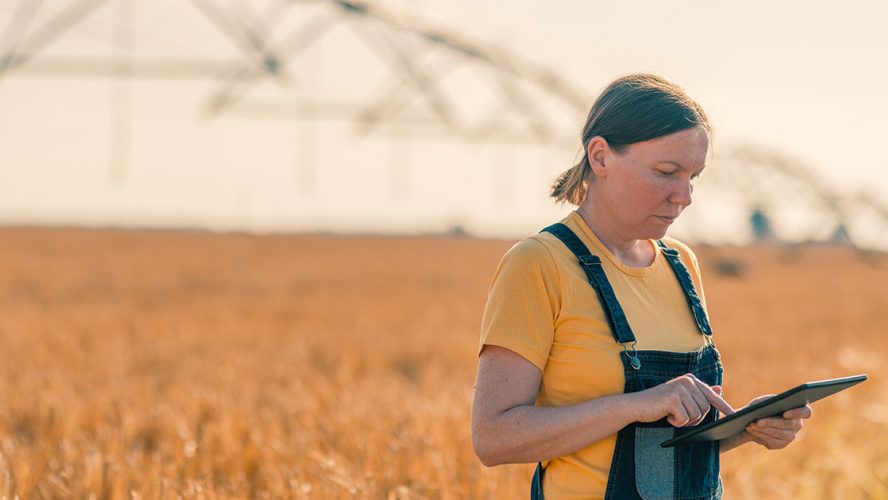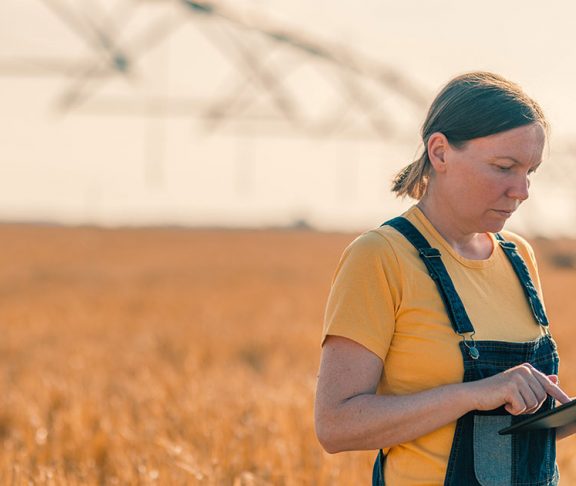
Joy O’Shaughnessy
Chief Operating Officer of Agribusiness, HighQuest Partners, LLC
As the youngest of six children and the only girl, Joy O’Shaughnessy knows a thing or two about succeeding in a male-dominated environment. O’Shaughnessy is the chief operating officer of agribusiness for HighQuest Partners, LLC in Bar Harbor, Maine, and the director of the company’s Women in Agribusiness event series. Her goal: to help women in agribusiness across the globe propel their careers.
“The ROI of having more women in senior positions has just become common knowledge,” said O’Shaughnessy, adding that boosted revenue and morale are just two of those benefits. “We don’t want to just talk about supporting women; we want to actually support them by giving them a platform for their expertise.”
Setting examples
At Women in Agribusiness events, which have been held since 2012, women get to meet face-to-face and learn about new career opportunities and aspects of the industry they may not be familiar with.
“We hear that a lot, especially from young women in agriculture — they say, ‘I never knew you could be in agriculture and do the things that these women were doing,” O’Shaughnessy said. “That’s literally the No. 1 comment we get from all the younger students and junior professionals — they didn’t understand you could be a lawyer in ag, an accountant in ag, and so it opens up your own viewpoint on what’s possible.”
One way to think of it is with the phrase, “You can’t be what you can’t see.” “I don’t know if I agree with that because there are trailblazers all around, but it’s easier to be something that you see, and so if you don’t see it, you might not know it exists,” O’Shaughnessy added.
Support roles
In terms of career opportunities, agribusiness offers many. After all, more than just farmers are needed to distribute food.
“You’ve got the scientists who are creating the fertilizers that the farmer uses, the engineers that are making the equipment that that farmer uses … the grain elevators, the scientists that go into making flavors and the different components of food, the equipment manufacturers, the people in transportation that get that seed from the grain elevator to that ingredient manufacturer in Europe,” said O’Shaughnessy, naming only a handful.
And there are the support roles available in agribusiness — the insurance companies, the lawyers, and the banks that help these wheels turn, as well as the people in human resources, marketing, and accounting.
“What I like to say is agribusiness is a wonderful field to focus on because food is not a luxury item; iPhones and cars and jeans are,” O’Shaughnessy said. “And yeah, you can work for HR or marketing or finance for those companies, but everyone needs to eat and everyone’s always going to need to eat. It’s a mission critical field for life. It’s a basic human need, and doing that in a way that is sustainable for both the planet and feeding the population is, I feel, not only important for the success of the human race as a species, but it’s a great mission to wake up every day and go do.”
Lifting up society
But more women need to be given the chance to lead these missions, not just take part in them, she said.
For one, it’s in businesses’ best interest. O’Shaughnessy explained that in 2014, HighQuest released data on 85 agribusiness companies that showed while many reported having a 40 to 50 percent female workforce, there were far fewer women in positions conducive to growth. At one company, for example, most of the women were in supporting roles that they could easily leave for another industry, while others were around retirement age.
“Not only do you need to be recruiting women, but you need to be recruiting them in your core business roles — because a woman who does research or scientific development of chemical use or fertilizer use, she’s probably not leaving agriculture,” she said.
Giving women the chance to excel in agribusiness is in the best interest of communities, too. For example, look no further than the surge of women breaking into technology to make a positive difference in the world.
“As women advance, their community advances around them,” she explained. “And I think this is a wonderful milestone of this new crop of women leading the charge on saving the planet. Their interest in this science and this technology not only speaks to how smart and amazing these women are, but it speaks back to that innate drive that women have to improve their community around them.”



